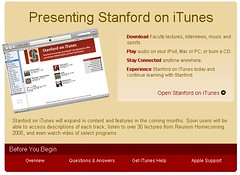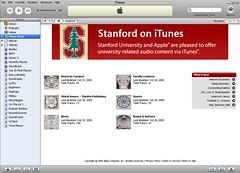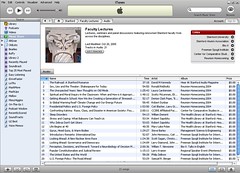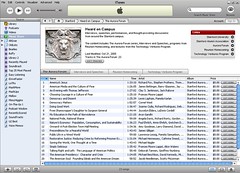Stanford on iTunes ... Where Podcasting & Academia Get Together
Saturday, October 22, 2005
Jodi S. Cohen writing in Newsday has an article called "Missed class? Try a podcast" [Via] which begins:
At Stanford, these technologies have been brought together in a way which will likely set the standard for podcasting within a tertiary framework. Enter iTunes on Stanford (I keep wanting to say iTunes upon Stanford, but maybe that's a bit too Shakespearean!) which is described thus:




[Click screenshots to enlarge.]
For more information, you can read Stanford's iTunes on Stanford FAQ (PDF), but I definitely think this is the most sophisticated and appealing academic podcasting arrangement I've seen so far (can anyone point out any others that are this far into development?). While there will undoubtably be some backlash about 'students not attending lectures' (etc.) I think flexible learning and eLearning are a part of most university structures, and podcasting offers the best digital lecture combination as far as I'm concerned. Moreover, if we still think of universities as producing, public knowledge, then podcasts offer a wonderful avenue for sharing knowledge outside the ivory tower of academic. Indeed, now I think of it, UWA's Institute for Advanced Studies records and releases streaming versions of many of our public lectures (with speakers as diverse and interesting as Gillian Beer and Mark Poster). There's a streaming archive here, but I must ask them to look into podcasting future lectures. Yes, I think this podcasting thing is here to stay ...
Update (22 Oct 05, 10.15pm): Here is the Official Stanford Press Release. Inside Higher Ed are also talking about Stanford on iTunes and may spawn an interesting discussion on the merits of podcasting.
Update 2 (23 Oct 05, 11.50am): D’Arcy Norman makes two important points:
Update 3 (29 Oct 05, 7.10pm): Wesley Fryer from Moving at the Speed of Creativity has some thoughtful responses, too:
[Tags: Stanford | podcast | itunes | apple | elearning | ipod | mp3 | academia | lecture | highered | flexibledelivery | ilecture]
When Purdue University senior Marcos Kohler skipped a physics class to attend a concert in Chicago, he didn't have to borrow a classmate's notes to catch up. Instead, he connected his iPod to a computer, downloaded the lecture, and from the comfort of a campus coffee shop, listened to the two-hour discussion on particle physics. "It re-creates the entire class experience," said Kohler, 22, who missed another lecture at the West Lafayette, Ind., campus when he overslept for the 1:30 p.m. class. A video conference class would be even better, he said, but "to go from paper printouts to audio, this is a step in the right direction." [...] Rick Bischoff, admissions director at Caltech, said a podcast is a perfect way to grab the attention of busy high school seniors. "I want high school students to listen and imagine, `That is a community I want to be part of.' Or say, `That doesn't sound like any place that I want to be a part of.'" Some universities, such as Purdue and North Carolina's Duke University, have university-wide programs that make it easy for professors to podcast.Podcasting, itself still a newish technology with barely a year behind it, has definitely hit the university scene. Lectures have been available in digital recording form for years, but almost always as streamed audio which required you sitting behind your computer to enjoy your academic audio! As I discussed earlier in 'Podcasting & eLearning', the same systems which created streaming audio can be re-tooled for podcasting (downloadable audio files) without too much hassle (as has happened with the UWA developed iLecture/Lectopia system) and the flexibility of taking your recorded lectures (and other audio and even video) with you in your iPod or other portable media device removes almost any excuse for missing a lecture (at least, that is, in the many hubs of broadband that characterise many Western universities). The potential application for podcasting is extremely broad: in the business of selling learning, podcasts offer a try-before-you-buy sampler; in the business of flexible delivery and eLearning, podcasts offer a reliable, full-quality, portable time-shifted lectures (with audio, now possibly video, albeit without the interactivity of the lecture theatre ... sometimes); and for educators looking for creative tools for getting students at any learning level engaged with their material, getting them to podcast--creating their own innovative digital audio--offers an enticing new assessment/project mediaform.
At Stanford, these technologies have been brought together in a way which will likely set the standard for podcasting within a tertiary framework. Enter iTunes on Stanford (I keep wanting to say iTunes upon Stanford, but maybe that's a bit too Shakespearean!) which is described thus:
Stanford on iTunes provides university-related audio content via the iTunes Music Store, Apple’s popular music jukebox and online music store. Stanford on iTunes gives alumni and the general public free access to a wide range of Stanford-specific digital audio content. The project includes two sites:In action, it looks like this...
[X] a public site, targeted primarily at alumni, which will include Stanford faculty lectures, learning materials, music, sports, and more.
[X] an access-restricted site for students delivering course-based materials and advising content.




[Click screenshots to enlarge.]
For more information, you can read Stanford's iTunes on Stanford FAQ (PDF), but I definitely think this is the most sophisticated and appealing academic podcasting arrangement I've seen so far (can anyone point out any others that are this far into development?). While there will undoubtably be some backlash about 'students not attending lectures' (etc.) I think flexible learning and eLearning are a part of most university structures, and podcasting offers the best digital lecture combination as far as I'm concerned. Moreover, if we still think of universities as producing, public knowledge, then podcasts offer a wonderful avenue for sharing knowledge outside the ivory tower of academic. Indeed, now I think of it, UWA's Institute for Advanced Studies records and releases streaming versions of many of our public lectures (with speakers as diverse and interesting as Gillian Beer and Mark Poster). There's a streaming archive here, but I must ask them to look into podcasting future lectures. Yes, I think this podcasting thing is here to stay ...
Update (22 Oct 05, 10.15pm): Here is the Official Stanford Press Release. Inside Higher Ed are also talking about Stanford on iTunes and may spawn an interesting discussion on the merits of podcasting.
Update 2 (23 Oct 05, 11.50am): D’Arcy Norman makes two important points:
Very cool. Great to see a Big School “get it” that by sharing resources freely they are not shooting themselves in the foot. Every university should be doing this as part of their contribution back to the community. ps. Yes, I know it’s not really podcasting, but close enough. The spirit is the same, and they provide some handy hooks to download all content at once. So it’s not fed to you via RSS. Whatever…I completely agree that in the spirit of the university producing public knowledge and the life of the mind, as much as possible should be available publicly. Of course, Stanford on iTunes is, as far as I can tell, just on iTunes (so far, at least), which does exclude normal file downloading without the Apple iTunes interface (which, admitedly, is free, but does chew resources rather greedily on older model PCs). An alternative web-based interface might also be the way to go to make sure everyone can download if they want to.
Update 3 (29 Oct 05, 7.10pm): Wesley Fryer from Moving at the Speed of Creativity has some thoughtful responses, too:
Secondly, it is also not entirely accurate to say that a podcast audience cannot interact with a professor, although the interaction modality certainly can change. There are more tools for out of class interactivity available than ever before. Instant messaging and asynchronous discussion boards, in addition to more traditional email and phone calls, are tools professors are using with success to provide feedback to students. [...] All this discussion again hightlights how podcasting is a disruptive technology. It offers potential to change instruction in fundamental ways. As I have said before, it is the professional obligation of educators to embrace podcasting and use its disruptive potential for constructive opportunities.
[Tags: Stanford | podcast | itunes | apple | elearning | ipod | mp3 | academia | lecture | highered | flexibledelivery | ilecture]

















0 Comments:
Post a Comment
<< Home